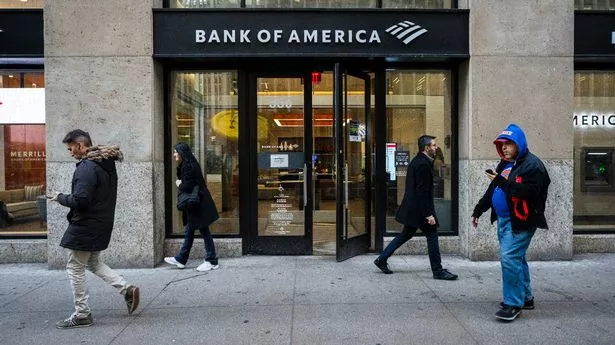Imagine waking up, craving that morning coffee, only to find your Bank of America account has vanished into thin air. No warning, no explanation—just gone. Sounds like a financial horror story, right? Well, for some, this nightmare has become a reality.
In this exposé, we’ll unravel the mystery behind Bank of America canceling accounts, explore the reasons, and, most importantly, arm you with strategies to ensure you’re not the next victim of this banking purge.
Table of Contents

Chapter 1: The Curious Case of Disappearing Accounts
Over the past few months, more and more Bank of America customers have reported that their accounts were suddenly closed without prior notice. People have logged into their online banking portals only to find that their accounts were locked or simply no longer existed. Others have tried to make purchases or withdraw cash, only to have their cards declined.
These aren’t just isolated incidents. Complaints have flooded social media, consumer forums, and even news outlets. Customers are left bewildered, asking, “Why me?” and scrambling to access their funds. While Bank of America claims that these closures are part of standard operational procedures, many believe there is more to the story.
Chapter 2: Why Is Bank of America Closing Accounts?
Banks have the right to close accounts under certain circumstances, but what exactly is triggering this recent wave of closures? Here are some of the most common reasons:
1. Inactivity
Banks often shut down accounts that have been inactive for a prolonged period. Generally, if an account sees no activity for three years or more, it may be flagged as abandoned. The funds in these accounts could even be sent to the state under escheatment laws.
2. Regulatory Compliance & Anti-Money Laundering Laws
Banks are required to comply with strict financial regulations to prevent illegal activities like money laundering and fraud. If your account triggers a suspicious activity alert (even unintentionally), it could be closed.
3. Operational Decisions & Risk Management
Banks periodically reassess their business strategies and might choose to close certain accounts that they consider high-risk or unprofitable. Sometimes, entire categories of accounts are discontinued.
4. Violation of Terms
If an account holder breaches the bank’s terms of service—for example, by frequently overdrawing funds, engaging in chargeback fraud, or conducting excessive cash transactions—the bank may terminate the account.
5. Overseas Transactions & Crypto Activity
Some customers who have engaged in frequent overseas transactions or cryptocurrency trading have reported sudden account closures. This suggests that Bank of America may be cracking down on accounts associated with high-risk financial behavior.

Chapter 3: Real Stories from Real People
To get a better picture of what’s happening, let’s look at some real-world cases.
Case Study 1: The Freelancer Shutdown
John, a freelance graphic designer, used his Bank of America account to receive payments from international clients. One day, he woke up to find his account closed with no prior warning. When he contacted customer support, he was told that “his transactions did not align with the bank’s risk profile.”
Case Study 2: The Single Mother Cut Off from Her Savings
Sarah, a single mother, had been saving for her child’s education in a Bank of America account for five years. She rarely withdrew money, thinking her savings were safe. When she tried to make a deposit one day, she was shocked to find out that her account had been closed due to “inactivity.”
Case Study 3: The Business Owner’s Nightmare
Mike, a small business owner, used Bank of America for payroll. One day, without warning, his business account was shut down. Employees’ paychecks bounced, and his reputation took a hit. The bank later claimed it was due to “a security review.”
Chapter 4: How to Protect Your Account
If you’re worried about becoming the next victim of Bank of America’s account closures, here are some steps to protect yourself:
- Keep Your Account Active – Regularly deposit and withdraw funds to show activity.
- Update Your Contact Information – Make sure the bank can reach you if they need clarification.
- Monitor Your Account – Check for unusual activity and resolve issues quickly.
- Avoid Large, Unusual Transactions – Sudden, high-value deposits or withdrawals can trigger red flags.
- Consider Opening a Backup Account – Having a secondary bank account ensures you won’t be left stranded if your primary account gets closed.
Chapter 5: Exploring Alternative Financial Strategies
With banks tightening their policies, it might be time to rethink your financial strategy. One option is diversifying your income streams and reducing dependence on traditional banks. Making money online has become a popular alternative, allowing people to generate income without relying on a single financial institution.
If you want a low-effort way to start, check out “The Laziest Way to Make Money Online For Beginners ($100+/Day).” It’s a simple, effective strategy that doesn’t require prior experience.
Chapter 6: What to Do If Your Account Gets Closed
If Bank of America cancels your account, follow these steps:
- Contact Customer Support – Demand an explanation and try to resolve the issue.
- Retrieve Your Funds – If possible, withdraw your money or request a check.
- Check Your Credit Report – Ensure the closure doesn’t negatively impact your credit score.
- File a Complaint – If the closure was unfair, report it to the Consumer Financial Protection Bureau (CFPB).
- Switch to Another Bank – Consider banking with institutions known for better customer service.
Conclusion: Stay Vigilant and Diversify
The trend of Bank of America canceling accounts serves as a stark reminder that financial security requires vigilance. By staying proactive, monitoring your accounts, and exploring alternative income sources, you can avoid unnecessary disruptions.
For more insights on financial pitfalls, check out our article on The Biggest Waste of Money. Stay informed, stay empowered, and take control of your financial future.



